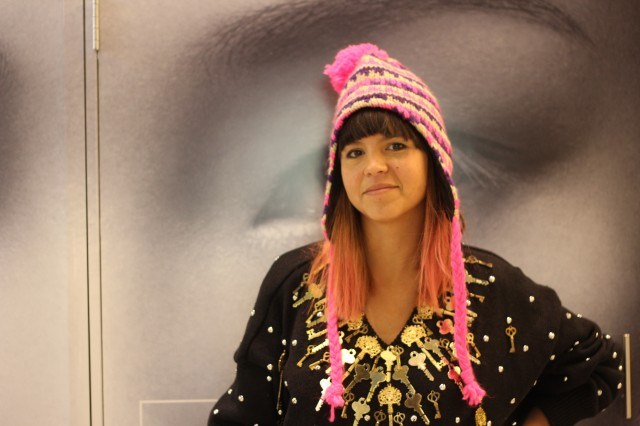African and indigenous ancestries colliding full force with digitized western sounds. This is the essence of Bomba Estereo.
“We make tropical music with a mix of electronic,” Liliana Saumet says. She is the lead singer of the Colombian band Bomba Estereo. “Colombia is a tropical place; even if Bogotá is cold and Santa Marta is hot, the whole country is the tropics. You feel that heat and culture (in the music), you can’t escape it.”
The band is coming back strong with their third album, “Elegancia Tropical,” (Tropical Elegance), released worldwide November 6, 2012.
The new album “is another phase of Bomba Estereo, a more mature, evolved and calm phase,” Saumet said. It reflects all of the years of travel and learning the band has done.
“It sends a message of looking within one’s self,” she said. It’s about stopping and breathing for a moment, and “realizing that in order to change what is happening on the outside you have to change what is happening on the inside.”
This message can be clearly heard in the album’s single, “El Alma Y El Cuerpo.” (The Soul And The Body)
Bomba Estereo was created in 2005 by guitarist Simón Mejía and in 2006 Saumet joined the project and became lead singer.
Mejía came up with the name. “He chose stereo because he likes the sound of the radio, in fact, his first band was called AM 770,” Saumet said. Mejía also chose bomba to reflect the positive side of the word as in “esto es una bomba,” loosely translating to something that is “hot.”
“We began to play because we got gigs,”she said. “I think at around the time we started there was a necessity for new things. There was a new musical scene opening in Latin America and Colombia.”
During the shows, the group noticed that there was one song in particular that got the crowd excited; “Fuego,” an old song of Mejía’s initially named “Corinto,” which he nearly threw out. “I told him: ‘this is awesome don’t throw it out, let’s put some lyrics of mine on top of the beat and use it,’” she said. “We needed songs to play because we didn’t have any.”
During shows people went crazy, screamed and danced explains Saumet. “We realized that this song had a powerful effect which helped it trespass frontiers within the independent music scene going far without any marketing, just a very strong beat.”
It was this “beat” that helped the hit album “Blow Up” sell 9,021 copies in the U.S. and win “disco de oro” (gold disc) for having sold more than 10,000 copies in Colombia.
People from as far as Japan and Morocco have embraced the sound of Bomba Estereo. “When we played in Morocco we were told that people would not dance, that it would be a very calm night,” the singer said. During the show she says, “there were only two girls visiting from Venezuela and the rest were all Moroccan, dressed in their traditional clothes and dancing, just two weeks before Ramadan.”
The sound that Bomba Estereo has created is Colombian but at the same time “has musical elements that people around the world can identify,” she said. “We are from the generation in which we are a mixture of things.” Growing up in Colombia, Saumet was influenced by cumbia, salsa, vallenato, rock, electronic music and hip-hop, among other genres.
It is this unique sound that has earned them the tittle of best new band in 2010 by MTV Iggyand recognition in the “Latin Hot List” in the first bilingual issue of Rolling Stone magazine in the U.S.
When Saumet turned 18, her longing for travel began and she went to college away from home in Barranquilla. “During that time I started a micro-company where I did bathing suits, clothes and bags painted by hand,” she said. “That is how I sustained myself though I don’t remember the name of the company, it was so long ago.”
During her time at college the singer’s mother was worried about her. “She always doubted whether I was going to be anything in life,” Saumet said. “In college I studied publicity and she saw that I never did anything with that, I just sat around painting things.”
After Barranquilla, Saumet moved to Bogotá where she submerged into music. “Both of my parents loved it and the same goes for the other members of the group, all of our parents are very proud of the band and what we have accomplished,” she said. “My parents just went to one of our concerts in Barranquilla with my grandmother and they all danced and sang along to our songs.”
Although Saumet grew up having a love for the arts she never thought that she would be singer; in fact she never even took a music class. Having no singing technique, Saumet derived inspiration from what she knew. “The only thing that came to mind was to sign something Costeño,” she said.
“Costeño” refers to the people of the Caribbean region of Colombia, also known as La Costa, where Saumet is from, heavily influenced by the indigenous and African heritage.
Saumet remembers one of the first times she sang on stage with the band.
“We were playing in a festival in Santa Marta for two thousand people,” she said. “I was very nervous because it was in my city and there were people who I knew and had never heard me sing. My stomach started hurting and I told myself ‘damn, what if every time I get on stage to sing, I feel like this? I don’t want this.’”
The singer took off her shoes and nervously walked on stage. ”I began to sing and then felt the ocean breeze and immediately the feeling went away and at that moment I knew that I could do this.”
by Mariana Dussan [NBC]


